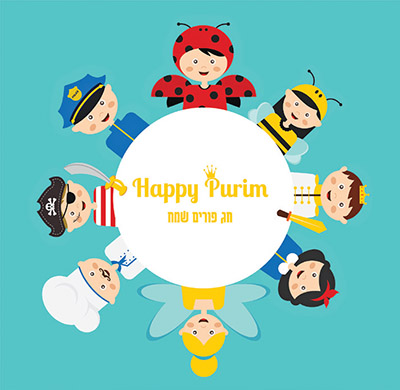
Human nature is a funny thing. At the root of our being we have a list of basic needs that range from interconnectivity, purpose and personal growth to egocentricity, survival and selfishness. How does one balance these to find a satisfactory equilibrium?
The answer to finding the sweet spot of the nuanced and complex aspects of human nature can be found in a somewhat hidden place—the story and customs of Purim.
Megilla—Reading the Purim Story:
We start the evening and daytime celebrations by gathering together to hear the story of Purim. A story that in itself inspires unity and personal growth. Beyond gathering to listen, we are instructed to hear each and every word of the Megilla, forcing us to rely on one another to be respectful and forcing ourselves to be conscious and considerate of those around us. The reader, too, must be aware of his position, staying in tune with the people listening around him, stopping if someone needs to cough or sneeze, reading loudly and clearly and taking breaks for us to join in the occasional outburst of noise, when we unanimously join forces to stomp out the common enemy, Haman, and all the selfishness, indulgence and greed he represents—aspects that we, too, must stomp out of our hearts in order to be good people and make the world around us better as well.
While the following Purim customs of mishloach manot, matanot l’evyonim and mishteh teach us the lessons integral to both personal satisfaction and being a good person, there are numerous organizations that provide a way for us to incorporate these principles year round.
From the One Jewish People Project, whose mantra is “Making the world a better place, together,” to Yad Ezra V’Shulamit, an organization that sends gifts to nourish poverty-stricken families in Israel with baskets of food and much more.
Mishloach Manot – Sending Gifts of Food
On Purim we are instructed to give food to at least one person, with at least two food types represented, ready to eat and ideally given via messenger. While one aspect is that giving a gift of food promotes feelings of good will towards one another, there is another element of care that can be found in the detail of giving readily edible gifts. You can find the same idea of caring in the way that organizations like Yad Ezra V’shulamit give. Not only does this food bank provide boxes of food to families in need year round, they have a focus on providing hot daily meals to children. It’s the difference between placing a bag with carrots, onions, celery and chicken bones in front of someone or a hot bowl of chicken soup. One is “nice”; the other is personal, caring and warm. Mishloach Manot therefore pushes us to go beyond giving with our hands to giving with our hearts.
Matanot L’evyonim—Charity to the Poor
Giving charity is in its essence an act of social responsibility. On Purim we are instructed to give to our brethren, an act that promotes personal connectivity. Why? Perhaps because when we give one-on-one to someone in need we learn to be grateful for being on the giving side, humbled by our brethren’s plight and united with each other to bring altruism, kindness and mercy into the world.
On Purim we give without judgment or questioning the validity of the hand held out by our door; we’re prepared with change on hand to give. But how can we set ourselves up to continue with charitable giving year round on a personal level? Thanks to the combination of this age-old tradition and technology there’s now an App on the market to fill the need of being able to give more easily, securely and quickly. The TzedakaApp is designed to replace cash donations to collectors, and provides users with the ultimate donation experience by allowing them to easily transfer funds, track their giving and confirm the collector’s identity, and it provides a tax deductible receipt. By simply downloading the app and following set-up instructions, users can manage and maximize their donations in the palm of their hand.
Mishteh—A Festive Meal
In contrast to the fasting we did to unify us as a nation in the story of Purim, we end the Purim celebrations with a festive meal, but not any ordinary meal. A meal that we share with family, friends, neighbors and even strangers. We invite them in wholeheartedly offering delicious food and hearty drink in the name of enhancing the joy of Purim and the unity its customs teach us.
As Jews, the things that unite us will always be stronger. The One Jewish People Project, an initiative promoting acts of kindness and mutual support, is helping to keep this theme of unity going by harnessing the strength of the Jewish People like the story that inspires change and unity. When we come together, we have the power to overcome all our enemies, including the ones within ourselves. By doing so we help bring goodness and joy to the world.
By Catherine Green









